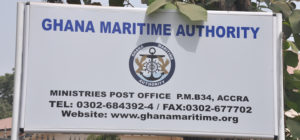Ghana Maritime Authority expresses concern over rising kidnapping cases on Gulf of Guinea
 Mr Thomas Alonsi, the Director-General, Ghana Maritime Authority (GMA), has expressed concern over the number of rising kidnapping cases on the Gulf of Guinea.
Mr Thomas Alonsi, the Director-General, Ghana Maritime Authority (GMA), has expressed concern over the number of rising kidnapping cases on the Gulf of Guinea.
“It is evident by reports from the International Maritime Bureau showing that even though there was a decline in overall worldwide incidents of piracy last year (2019), there was an alarming increase in crew kidnappings across the Gulf of Guinea,” Mr Alonsi stated on Monday at the opening of the Fourth Executive Council Meeting of the Association of African Maritime Administration (AAMA) in Accra.
“The number of crew kidnapped in this area increased by more than 50 per cent from 78 in 2018 to 121 in 2019.”
The two-day meeting, which is being hosted by the Ghana Maritime Authority (GMA), is being attended by over 40 participants drawn from across the African continent.
The meeting, which seeks to deliberate on pertinent issues relating to the African Maritime Sector was formally opened by Mr Daniel Nii Kwartei Titus Glover, a Deputy Minister of Transport.
Mr Alonsi said the international trade (and for that matter maritime transport) was critical to almost all African economies, adding that the maritime trade and sustainability of Africa’s marine resources would develop further only if the marine environment was safe and secured.
He mentioned the increasing illicit activities that continue to plague the continent’s maritime domain, particularly in the Gulf of Guinea.
He said this essentially called for greater collaboration necessary to put in place the institutions and capabilities to ensure security and the rule of law in order to address these illicit maritime activities and transnational organized crimes in our waters.
He said the vast majority of the Continent’s populations depended on its oceans and inland water for their livelihood and for transportation.
He noted that increasingly and more recently the oceans had also served as the major source of energy and mineral needs through the exploration of hydrocarbons; declaring that the oceans therefore, played a very significant role in our very existence as a continent, hence the need to have a coherent policy for its sustainable use.
“I must say that when we deal with complex issues such as implementation of Africa’s Integrated Maritime Strategy (AIMS) 2050 we must stick to the principles,” he said.
The principles here were the development agenda of the African Union (AU) which sought to promote human capital development, sustainable development of Africa’s marine resources to generally improve the people’s standard of living.
Mr Kweku Ofori Asiamah, the Minister of Transport, in a speech read on his behalf called for fair representation for African on the International Maritime Organisation (IMO) Council, to enable the continent play a major role in the maritime industry.
He said to put across issues that affect the African Maritime Industry at the international level, Africa must be well represented at the IMO Council.
Mr Asiamah said that at the last IMO Assembly Session, only three African countries namely, Egypt, Kenya and South Africa were elected to serve on the Council.
“Clearly, African states are underrepresented and we need to do more to increase our presence and participation on the Council.”
Mr Sobantu T. Tilayi, Chairman, AAMA, said the AAMA Executive Council was made up of representatives of Central Africa (Cameroun and Cape Verde), West Africa (Cote d’Ivoire and Ghana), East Africa (Tanzania and the Comoros), Southern Africa (Mozambique and South Africa), North Africa (Egypt and Sudan) and Uganda representing the landlocked countries.
He noted that the choice of the countries in the Executive Council was to ensure geographical spread.
He announced that the Fifth AAMA Executive Council Meeting would be held in the last quarter of the year in Durban, South Africa.
Source: GNA
